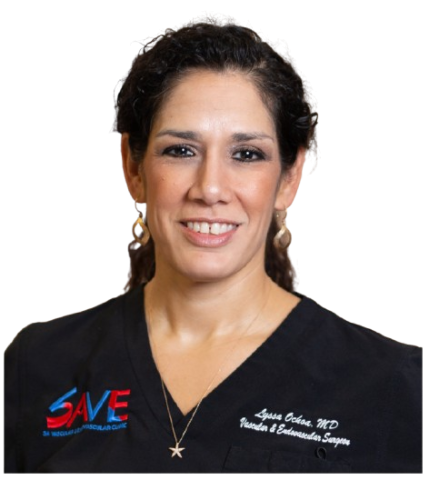Raised in the southern border town of Mission, Texas, by two educators who instilled in her a deep sense of service and community, Lyssa Ochoa, MD, has built a career that intertwines her cultural roots with her commitment to underserved communities. As a Mexican American vascular surgeon, Ochoa’s journey has been defined by her dedication to addressing healthcare disparities and improving patient outcomes in the community she serves.

Her medical training took her to Houston, where she completed medical school, residency and her fellowship at Baylor College of Medicine. After gaining experience in a private practice in San Antonio, she began to reflect on her true career aspirations and values. This introspection led her to establish the San Antonio Vascular and Endovascular (SAVE) Clinic in 2018 with a mission to serve the most neglected areas in San Antonio.
“No other vascular surgeons wanted to go where we were going, citing factors like ‘bad payor mix’ or inconvenience, but these were the areas with the most diabetic-related amputations, and our goal was to figure out how we could deliver top-quality vascular care to those who need it most,” said Ochoa.
Today, Ochoa oversees eight clinics in the San Antonio area, including two in rural South Texas. Her practice goes beyond providing medical care; it addresses social determinants of health that heavily impact patient outcomes.
“We’re involved with every entity here who cares about the health of these communities, but it’s become much more than that. They see us as part of the community, not as strangers coming into their neighborhood, but ones who they can trust to take care of them,” said Ochoa.
Reflecting on Hispanic Heritage Month, Ochoa emphasizes that the celebration is more than just recognizing cultural contributions; it’s about raising awareness of the unique challenges Hispanic communities face, particularly in healthcare. Despite living in a majority Hispanic city, she notes that discussions around healthcare inequities often overlook the Hispanic population.
“It's important not only to reflect what the Hispanic culture has brought to a city like San Antonio but to our state and to our country. Texas is now a plurality Hispanic state and many large cities across this country have significant Hispanic populations. While we recognize and appreciate the different cultures in these populations, it’s going to be vital to the success of any city that we learn how to address their health needs,” said Ochoa.
Ochoa is committed to changing this narrative by highlighting the preventable chronic conditions disproportionately affecting these communities, such as diabetes and peripheral artery disease (PAD) and the systemic issues like historical segregation and redlining that continue to perpetuate health disparities.
Ochoa’s goal during Hispanic Heritage Month is to spotlight these critical issues and push for a more equitable healthcare system. Recently, she helped establish the Center for Health Equity in South Texas (CHEST), a nonprofit aimed at addressing the region's health disparities. The organization brings together various sectors, including infrastructure, education and public health, to create a holistic approach to improving community health and reducing the 20-year lifespan gap between different areas of San Antonio.
Ochoa also offers advice to her fellow members of the vascular community, urging them to recognize the marginalized communities that “suffer the consequences of very preventable chronic conditions” like type two diabetes, high blood pressure, PAD and other complications.
“Being a vascular surgeon involves figuring out how we address people's needs. What’s been important in my practice is serving these communities and recognizing that vascular surgery alone, and even clinical or medical care alone, is not going to address the issues if we don't sit and talk to our patients about their challenges in everyday life - whether it’s transportation, health literacy like understanding their medications, or poverty determining whether they choose one need over another” said Ochoa.
Ochoa hopes that her words, as part of the SVS Foundation’s “Voices of Vascular” series, will inspire action, not just reflection. By action, she means incorporating diversity beyond social media posts and into investments.
Ochoa is passionate about increasing the representation of Latinas in medicine, recognizing that when patients see healthcare providers who share their cultural background, it enhances the care they receive. Through mentorship ranging from shadowing, internships, clinical rotations and more, she encourages young Latino students to pursue careers in medicine, emphasizing the importance of having a medical workforce that reflects the diverse communities it serves.
When you donate to the SVS Foundation, you support Voices of Vascular's important work in promoting diversity, equity, and inclusion. Learn more and make your gift today.
